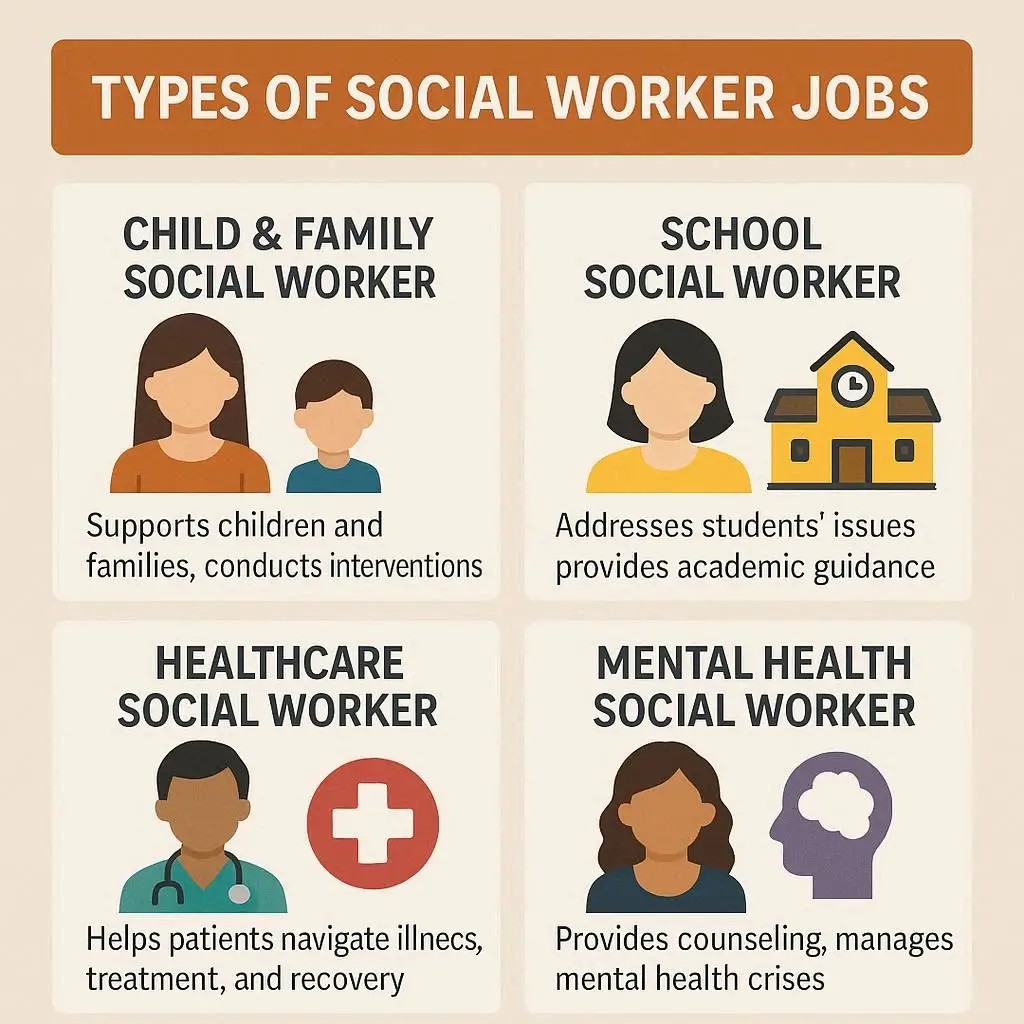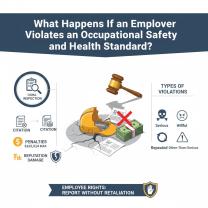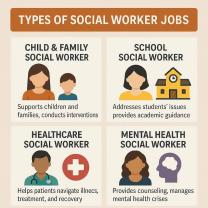What are the different types of social worker jobs?
Here’s a clear breakdown of the different types of social worker jobs and career paths
Main Types of Social Worker Jobs
1. Child, Family, and School Social Workers
What they do: Help children and families improve well-being, deal with abuse/neglect, and access resources.
Settings: Schools, child welfare agencies, family service organizations.
Example tasks: Counseling students, connecting families with housing or healthcare, supporting foster care.
2. Healthcare Social Workers
What they do: Support patients and families dealing with illnesses, hospital stays, and treatment plans.
Settings: Hospitals, clinics, nursing homes, rehabilitation centers.
Example tasks: Helping patients understand diagnoses, planning for home care, connecting with financial/insurance resources.
3. Mental Health and Substance Abuse Social Workers
What they do: Provide therapy, counseling, and crisis intervention for people with mental health issues or addiction.
Settings: Mental health clinics, rehabilitation centers, community agencies, private practice.
Example tasks: Individual/group counseling, relapse prevention, crisis response.
4. Clinical Social Workers (LCSWs)
What they do: Licensed professionals who diagnose and treat mental, behavioral, and emotional disorders.
Settings: Private practice, hospitals, schools, community health organizations.
Example tasks: Psychotherapy, developing treatment plans, case management.
5. Gerontological Social Workers
What they do: Specialize in working with older adults and their families.
Settings: Nursing homes, hospice, senior centers, community organizations.
Example tasks: End-of-life planning, elder abuse prevention, connecting seniors to resources.
6. Community Social Workers
What they do: Focus on broader community issues, social justice, and advocacy.
Settings: Nonprofits, government agencies, advocacy groups.
Example tasks: Organizing community programs, influencing policy, promoting social change.
7. Military and Veterans Social Workers
What they do: Assist service members, veterans, and their families with unique challenges.
Settings: VA hospitals, military bases, veteran service organizations.
Example tasks: PTSD counseling, reintegration support, family services.
8. School Social Workers
What they do: Support students’ academic and social success.
Settings: Elementary, middle, and high schools.
Example tasks: Counseling students, mediating teacher-student conflicts, linking families with community resources.
Career Path Summary
Entry-level roles: Caseworker, intake specialist, program coordinator.
Advanced roles: Licensed Clinical Social Worker (LCSW), supervisor, program director.
Specialized areas: Healthcare, education, mental health, advocacy, policy work.
In short: Social workers can specialize in child & family services, healthcare, mental health, geriatrics, schools, military/veterans, and community advocacy — with options ranging from direct counseling to policy and program leadership.
Here’s a comparison table of the main types of social worker jobs, their settings, and duties:
Types of Social Worker Jobs
| Type of Social Worker | Common Work Settings | Typical Duties |
|---|---|---|
| Child, Family, and School Social Worker | Schools, child welfare agencies, family service organizations | Support children/families, prevent abuse/neglect, connect families to resources, assist foster care |
| Healthcare Social Worker | Hospitals, clinics, rehabilitation centers, nursing homes | Help patients understand diagnoses, plan treatment, arrange home care, provide emotional support |
| Mental Health & Substance Abuse Social Worker | Mental health clinics, rehab centers, community agencies, private practice | Provide counseling/therapy, crisis intervention, relapse prevention, support recovery |
| Clinical Social Worker (LCSW) | Private practice, hospitals, community health orgs, schools | Diagnose/treat mental health issues, provide psychotherapy, develop treatment plans, case management |
| Gerontological Social Worker | Nursing homes, senior centers, hospice, community organizations | Support older adults, end-of-life planning, connect seniors with resources, prevent elder abuse |
| Community Social Worker | Nonprofits, government agencies, advocacy groups | Organize community programs, influence policy, advocate for social justice and systemic change |
| Military & Veterans Social Worker | VA hospitals, military bases, veteran service orgs | Assist with PTSD, family support, reintegration into civilian life, connect with veteran benefits |
| School Social Worker | Elementary, middle, and high schools | Counseling students, mediating conflicts, promoting student well-being, linking families with services |
This table makes it easy to see where each type of social worker works and what they typically do.
What Are the Different Types of Social Worker Jobs?
The field of social work is incredibly diverse, offering a wide range of specializations to address the varied needs of individuals, families, and communities. The most common types of social worker jobs are categorized by the populations they serve and the settings in which they work. These include:
Child, Family, and School Social Workers: These professionals work with children and families to ensure child safety, well-being, and academic success. They may work in schools, child protective services, or family counseling agencies.
Healthcare Social Workers: Operating in hospitals, clinics, and long-term care facilities, healthcare social workers help patients and their families navigate the emotional, social, and logistical challenges of illness, injury, and disability.
Mental Health and Substance Abuse Social Workers: These practitioners provide therapy, counseling, and case management services to individuals and groups dealing with mental health disorders, addiction, and other behavioral issues.
Community Social Workers: Focused on a macro level, they work to improve conditions for entire communities. This can involve policy advocacy, community organizing, and program development to address issues like poverty, homelessness, and public health.
Forensic Social Workers: Working within the legal system, these social workers provide expert testimony, conduct psychosocial assessments, and advocate for clients in various legal settings, including family and criminal courts.
How Do Social Worker Roles Differ Across Sectors?
The social work profession spans across the public, non-profit, and private sectors, with each offering a unique environment and set of responsibilities.
Public Sector: Social workers in this sector are employed by government agencies at the local, state, or federal level. Roles often involve working in child protective services, public health departments, or veterans' affairs. The work is typically governed by specific laws and regulations, and may involve a heavy caseload.
Non-Profit Sector: Many social workers find a home in non-profit organizations, which are mission-driven and focused on a specific cause, such as homelessness, domestic violence, or immigrant services. The work in this sector can be highly specialized and often involves both direct client service and community advocacy.
Private Sector: While less common for direct service roles, social workers in the private sector may work in private practice as therapists, or as consultants for employee assistance programs in corporate settings. They often have more autonomy but may also handle a broader range of responsibilities, including business management.
What Are the Requirements for Different Social Work Positions?
The educational requirements for social work vary based on the desired position and level of practice.
Bachelor's in Social Work (BSW): This is the entry-level degree for generalist social work practice. A BSW can qualify you for jobs in child welfare, mental health, and aging services, often in a non-clinical capacity.
Master's in Social Work (MSW): An MSW is the standard for advanced and clinical practice. It is required for roles such as a clinical therapist, school social worker, or medical social worker. An MSW program includes coursework and field education, preparing students for licensure.
Licensing and Certification: After obtaining an MSW, social workers must become licensed by their state to practice independently. This typically involves a period of supervised clinical experience followed by a licensing exam. The specific license names vary (e.g., Licensed Clinical Social Worker (LCSW), Licensed Master Social Worker (LMSW)).
How to Choose a Social Work Career Path?
Selecting a career path in social work is a deeply personal decision that should align with your interests, values, and long-term goals.
Self-Assessment: Reflect on the populations you are passionate about serving. Are you drawn to working with children, the elderly, or those struggling with addiction? Consider the environment you'd like to work in—a hospital, a school, or a non-profit organization.
Gain Experience: Field placements and internships are essential. They provide hands-on experience in different settings and help you understand the realities of a particular social work role.
Network with Professionals: Speak with social workers in different fields to learn about their day-to-day responsibilities, challenges, and rewards. Their insights can be invaluable in helping you make an informed decision.
What Skills Are Needed for Various Social Work Jobs?
Regardless of the specific path, successful social workers share a core set of skills that are essential for effective practice.
Empathy and Compassion: The ability to understand and share the feelings of another is at the heart of social work. It allows you to build trust and rapport with clients.
Communication Skills: Social workers must be excellent listeners and communicators, able to convey complex information clearly and sensitively to clients, families, and other professionals.
Problem-Solving: Social workers are skilled at assessing complex situations, identifying underlying issues, and developing creative, practical solutions to help clients overcome challenges.
Resilience and Self-Care: The work can be emotionally demanding. The ability to manage stress and practice self-care is crucial for preventing burnout and sustaining a long and successful career.
Organizational and Time Management Skills: Juggling heavy caseloads and administrative duties requires strong organizational skills to ensure all client needs are met efficiently.













